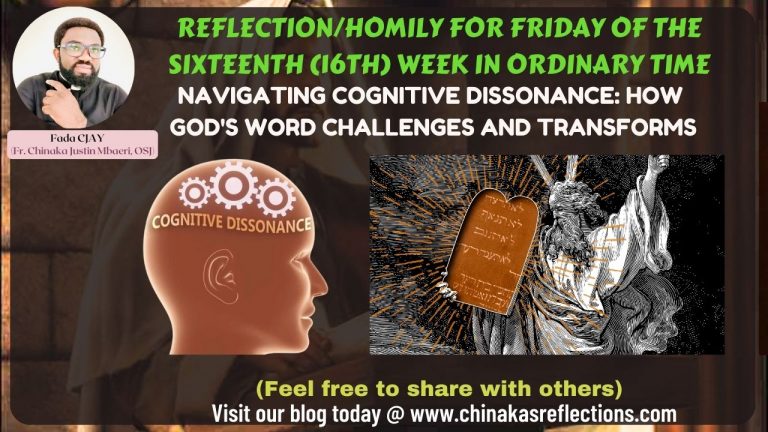NAVIGATING COGNITIVE DISSONANCE: HOW GOD’S WORD CHALLENGES AND TRANSFORMS
First Reading: Exodus 20:1-17
Responsorial Psalm: Psalm 18(19):8-11
Gospel Reading: Matthew 13:18-23
____________________________________
Some time ago, I stumbled upon one of the most intriguing and profound phenomena in human psychology, which is the “Cognitive Dissonance Theory,” proposed by the renowned psychologist, Leon Festinger. This theory posits that when individuals encounter information that challenges their existing beliefs or values, they experience a state of cognitive dissonance—a mental discomfort arising from the conflict between their established convictions and the newly presented ideas. To resolve this inner conflict, individuals are compelled to either modify their beliefs to align with the new information or to reject the new information altogether. Drawing inspiration from the Cognitive Dissonance Theory, today, we shall reflect on how God’s Word challenges our existing beliefs or mindsets, provokes cognitive dissonance, and calls us to cooperate in bringing about positive changes in our lives. As we delve into the readings, we traverse the landscapes of the human psyche, witnessing the divine drama of revelation and human response unfold before us.
In the First Reading from Exodus (20:1-17), we witness God presenting the Ten Commandments to Moses and the people of Israel. The Ten Commandments serve as the divine moral code—a set of instructions guiding humanity toward righteous living and harmonious relationships. As the people received these commandments, they were confronted with a cognitive dissonance moment. The commands of God challenged their existing beliefs and idolatrous behaviours, creating cognitive dissonance within their hearts and requiring them to confront their weaknesses and shortcomings. Here, we witness the foundational aspect of God’s Word—its ability to challenge and transform deeply ingrained beliefs and values, leading us to reevaluate our actions and attitudes.
In the Responsorial Psalm (18/19:8-11), the psalmist extols the beauty and wisdom of God’s law, affirming its transformative impact on the human soul. God’s Word acts as a light that enlightens the eyes and as a sweeter delicacy than honey. As the psalmist immerses in the splendor of God’s revelation, he experiences the cognitive dissonance between God’s perfect law and human fallibility. Embracing God’s Word requires a willingness to confront our imperfections and submit to divine guidance, leading to personal growth and spiritual renewal.
The parable of the sower in the Gospel Reading of Matthew (13:18-23) further illuminates the dynamics of receiving and responding to God’s Word. The seed, which symbolizes God’s Word, is sown in various types of soil, representing the diverse conditions of human hearts. The different responses—ranging from rejection and shallow reception to fruitful growth—reflect the varying ways people experience cognitive dissonance in the face of God’s Word. Some hearts harden and resist the Word due to entrenched beliefs or worldly distractions, while others receive it with joy, only to falter in times of trial. However, the receptive heart, like fertile soil, embraces God’s Word with openness, allowing it to take root and produce a bountiful harvest of righteousness.
Dear friends in Christ, reflecting on today’s readings about the reception of God’s Word, a verse from the Letter to the Hebrews (4:12) remains poignant. “The Word of God is something alive and active, it cuts more finely than any two-edged sword, piercing to the division of soul and of spirit, of joints and of marrow, and can judge secret emotions and thoughts.” Here, we see the transformative and powerful nature of the Word of God, that it has the ability to penetrate deeply into the core of a person’s being, revealing their innermost thoughts and intentions; and due to its catalytic effects, it is capable of bringing about positive change in the lives of those who welcome it with their whole hearts, and bearing fruits that lasts for eternity. Therefore, like the Israelites, we are invited to embrace the Decalogue as the path to true freedom and fulfillment. We are encouraged, like the psalmist, to delight in God’s law, allowing it to reshape our hearts and minds. And just as the receptive heart in the parable yields an abundant harvest, we too must cooperate with God’s Word, allowing it to transform us from within.
As we encounter the living Word of God, may we be willing to embrace the cognitive dissonance it may bring, for in that sacred tension lies the opportunity for profound spiritual growth and renewal. Let us cooperate with divine grace, allowing the Word to challenge and transform our lives, bringing us closer to God’s truth and leading us on the path of righteousness. May the encounter with God’s Word be an awe-inspiring journey, where the ordinary gives way to the extraordinary, and the mundane transforms into the miraculous, all by the power of His transformative and life-giving Word. Amen.
(CLICK HERE FOR THE NEXT DAY’S REFLECTION: REFLECTION/HOMILY FOR THE MEMORIAL OF SAINTS MARTHA, MARY AND LAZARUS)
Shalom!
© Fr. Chinaka Justin Mbaeri, OSJ
Paroquia Nossa Senhora de Loreto, Vila Medeiros, São Paulo, Brazil
nozickcjoe@gmail.com / fadacjay@gmail.com
__________________________
Have you prayed your rosary today?


